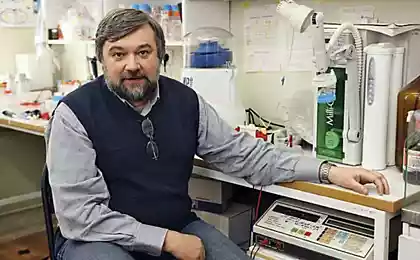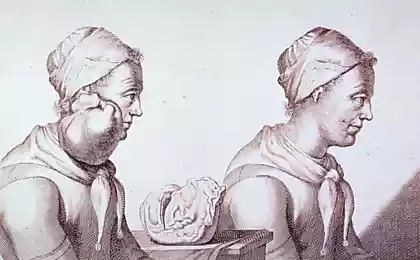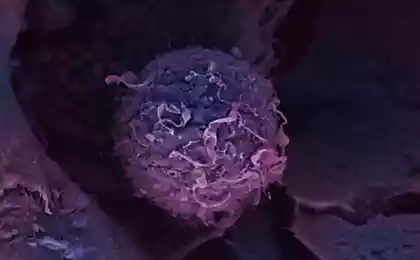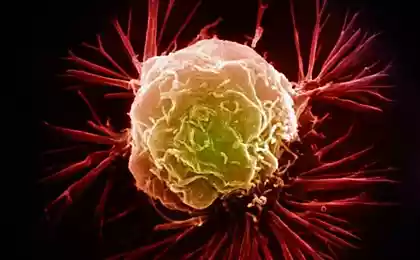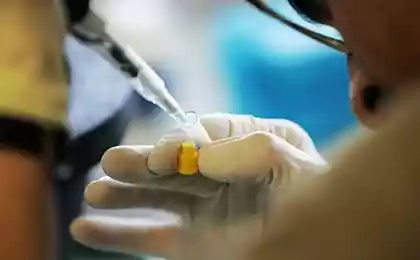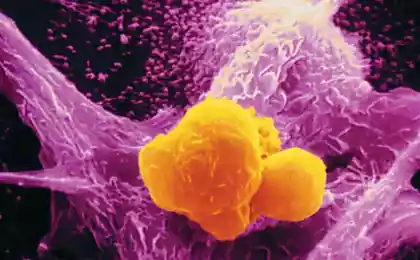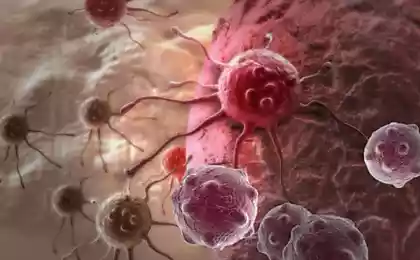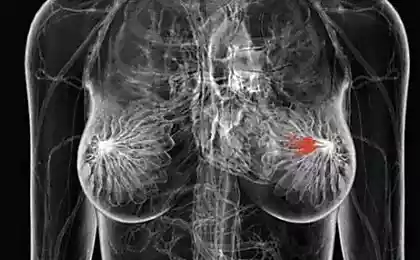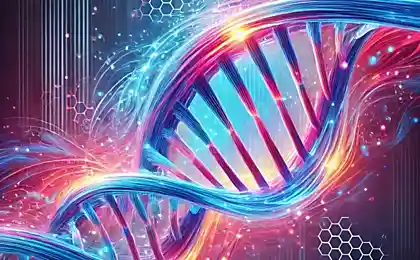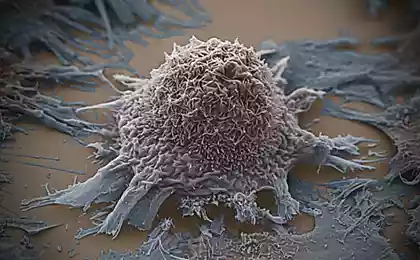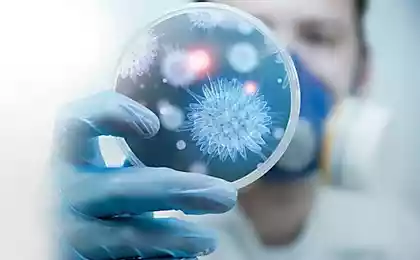551
Bad luck — more likely to cause cancer than lifestyle or genes
Two-thirds of cancer cases among adults caused by a random mutation of DNA, but, according to a new study, an unhealthy lifestyle can contribute to "bad luck factor".
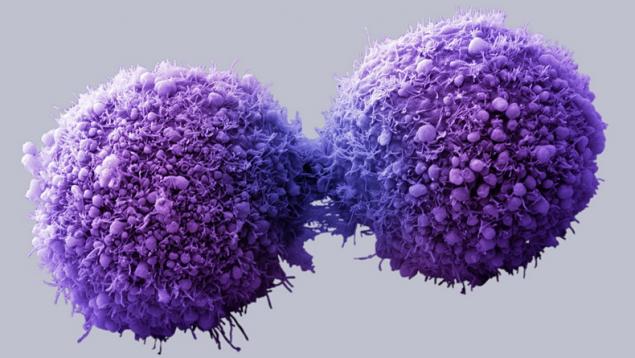
Cell division cancer of the pancreas
According to a recent study, scientists have suggested that cancer is mainly caused by unfortunate circumstances and is not the result of unhealthy lifestyles, diet or inherited genes.
Two-thirds of cases of different types of cancer among adults caused by a random mutation of DNA that occurs during cell division. The remaining third is associated with environmental factors or defective inherited genes.
However, scientists warn that poor lifestyle choices can contribute to "bad luck factor" involved in the appearance of cancer.
The researchers examined published data on the number of divisions of self-renewing stem cells that for the average duration of human life occur in 31 different tissues.
These results were compared with the frequency of occurrence of cancer in the same tissues during a person's life.
The study was discovered a close connection between the frequency dividing stem cells of a specific tissue and the tendency of the latter to the development of cancer.
The more often cells divide, the more likely it is that letters of their genetic code will mix, leading to an increased risk of cancer.
Overall, the results of the study showed that is caused by division of stem cells random mutations can be the cause of about 65 percent of cancer cases.
According to Professor School of medicine Johns Hopkins University Bert Vogelstein, "all cancers are caused by a combination of unfortunate circumstances, environment and heredity, and we've created a model that may help quantify how these three factors contribute to the development of cancer."
"This study shows that the risk of cancer increases due to Smoking or other factors of an unhealthy lifestyle. However, many forms of cancer are mostly associated with failure in the form of mutations in the gene driver of cancer, regardless of lifestyle and hereditary factors. The best way to destroy these types of cancer – early detection, when they are still curable by surgery".
For over a century scientists have known that some types of tissue the cancer originates in a million times more often than in others, but the reason for this remains unknown.
Published in the journal Science the results of the study indicate that mainly the answer lies in the number of times that the stem cells of a particular tissue are divided and propagated your DNA.
"Bad" mutations – occur when one chemical letter in DNA is incorrectly replaced with another during reproduction of cells – explained 22 of the 31 cancer types studied. The incidence of the other nine species were higher than predicted in the framework of the "bad luck", perhaps due to the influence of environmental or hereditary factors.
Professor Vogelstein added: "We found that cancers, with greater risk than was predicted by the number of divisions of stem cells, were the most expected – including lung cancer, which is linked to Smoking; skin cancer associated with sun exposure; and other cancers associated with hereditary syndromes".
According to the Professor, people living a long life despite exposure to cancer-causing substances such as tobacco, should be thankful not so much good genes, how much luck.
Vogelstein noted that in the tissue of the colon was recorded four times more stem cell divisions than tissue in the small intestine. Also colon cancer was much more common than cancer of the small intestine.
In mice, the situation was reversed: in the tissue of the large intestine was smaller divisions of stem cells, and it was less prone to cancer than the small intestine.
According to the research associate, biomathematics from the Johns Hopkins University Dr. Christian Tomasetti, "if two-thirds of cases of cancer in different tissues due to random mutation of DNA that occurs during the division of stem cells, change of lifestyle and habits will be of immense help in preventing some types of cancer. However, for various reasons, this method may not be very effective."
"We should focus more resources on finding ways to detect such cancers at early, curable stages," Tomasetti added.
Source: mixednews.ru/archives/70956

Cell division cancer of the pancreas
According to a recent study, scientists have suggested that cancer is mainly caused by unfortunate circumstances and is not the result of unhealthy lifestyles, diet or inherited genes.
Two-thirds of cases of different types of cancer among adults caused by a random mutation of DNA that occurs during cell division. The remaining third is associated with environmental factors or defective inherited genes.
However, scientists warn that poor lifestyle choices can contribute to "bad luck factor" involved in the appearance of cancer.
The researchers examined published data on the number of divisions of self-renewing stem cells that for the average duration of human life occur in 31 different tissues.
These results were compared with the frequency of occurrence of cancer in the same tissues during a person's life.
The study was discovered a close connection between the frequency dividing stem cells of a specific tissue and the tendency of the latter to the development of cancer.
The more often cells divide, the more likely it is that letters of their genetic code will mix, leading to an increased risk of cancer.
Overall, the results of the study showed that is caused by division of stem cells random mutations can be the cause of about 65 percent of cancer cases.
According to Professor School of medicine Johns Hopkins University Bert Vogelstein, "all cancers are caused by a combination of unfortunate circumstances, environment and heredity, and we've created a model that may help quantify how these three factors contribute to the development of cancer."
"This study shows that the risk of cancer increases due to Smoking or other factors of an unhealthy lifestyle. However, many forms of cancer are mostly associated with failure in the form of mutations in the gene driver of cancer, regardless of lifestyle and hereditary factors. The best way to destroy these types of cancer – early detection, when they are still curable by surgery".
For over a century scientists have known that some types of tissue the cancer originates in a million times more often than in others, but the reason for this remains unknown.
Published in the journal Science the results of the study indicate that mainly the answer lies in the number of times that the stem cells of a particular tissue are divided and propagated your DNA.
"Bad" mutations – occur when one chemical letter in DNA is incorrectly replaced with another during reproduction of cells – explained 22 of the 31 cancer types studied. The incidence of the other nine species were higher than predicted in the framework of the "bad luck", perhaps due to the influence of environmental or hereditary factors.
Professor Vogelstein added: "We found that cancers, with greater risk than was predicted by the number of divisions of stem cells, were the most expected – including lung cancer, which is linked to Smoking; skin cancer associated with sun exposure; and other cancers associated with hereditary syndromes".
According to the Professor, people living a long life despite exposure to cancer-causing substances such as tobacco, should be thankful not so much good genes, how much luck.
Vogelstein noted that in the tissue of the colon was recorded four times more stem cell divisions than tissue in the small intestine. Also colon cancer was much more common than cancer of the small intestine.
In mice, the situation was reversed: in the tissue of the large intestine was smaller divisions of stem cells, and it was less prone to cancer than the small intestine.
According to the research associate, biomathematics from the Johns Hopkins University Dr. Christian Tomasetti, "if two-thirds of cases of cancer in different tissues due to random mutation of DNA that occurs during the division of stem cells, change of lifestyle and habits will be of immense help in preventing some types of cancer. However, for various reasons, this method may not be very effective."
"We should focus more resources on finding ways to detect such cancers at early, curable stages," Tomasetti added.
Source: mixednews.ru/archives/70956
Street cat, who raised a host and famous all over the world
Our life stories or how thoughts become reality

